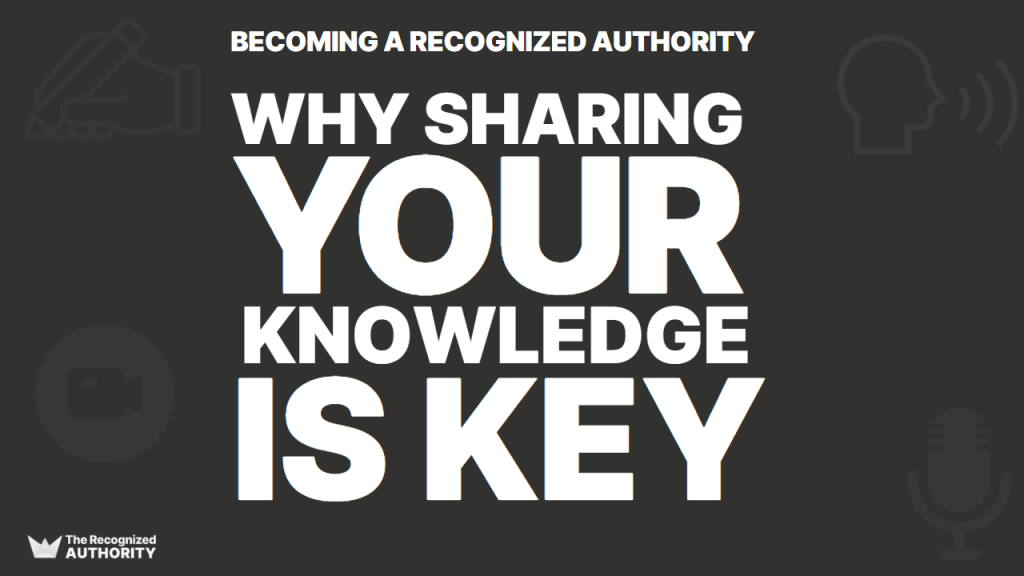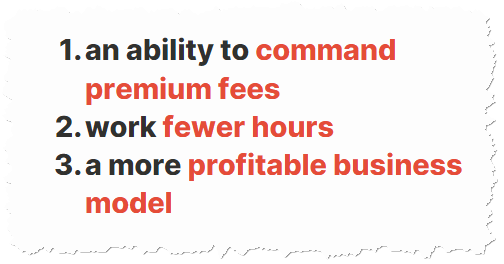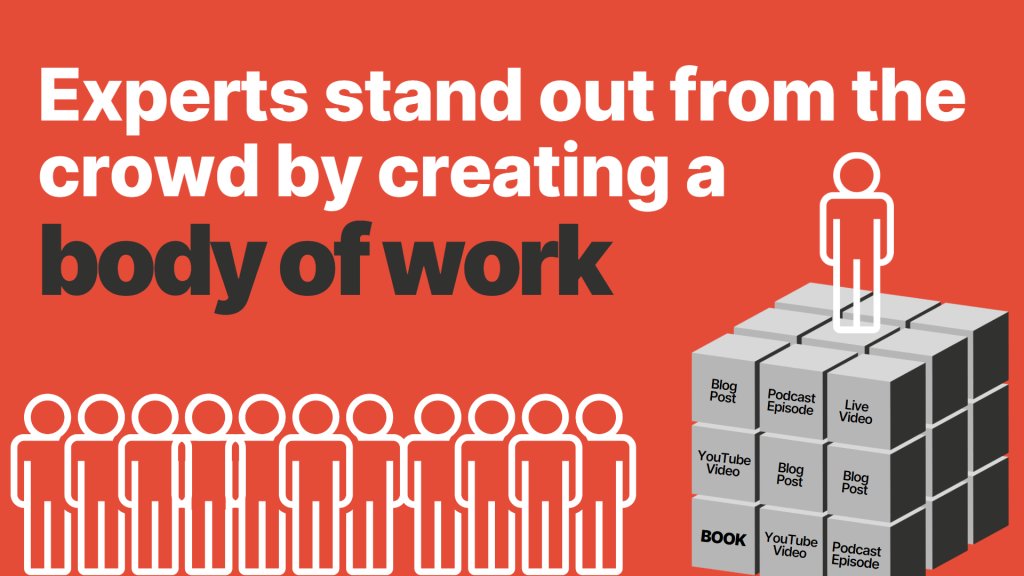 In the context of expertise, building your personal authority is about gaining credibility, trust, and recognition.
In the context of expertise, building your personal authority is about gaining credibility, trust, and recognition.
And once you start building authority, you will start getting more inbound leads, which enables you to command premium fees and work less hours.

That’s the end goal.
How do we build authority?
It’s very simple: we share our expertise publicly.
This helps in several key ways:

1. We learn from the act of writing itself.
It starts with words – we first need to express our knowledge and expertise in words. And writing about a topic helps us to develop our thinking on a topic. A friend of mine said “I don’t write because I have ideas, I have ideas because I write.”
This means we continuously learn and sharpen our thinking on our topic, and how better to communicate it.
2. We risk criticism.
When we share our thinking that in whatever medium we choose, we are putting it out into the world.
We are taking a risk, however small, that others will disagree or criticise our thinking. That’s part of learning and growing as an expert.
But the interesting thing is that this risk is recognized and appreciated by others, sometimes consciously and sometimes unconsciously. Taking that risk tells them that you are brave enough to speak up, put your work out there – we use phrases like “settling an example”, “it takes guts to do that” and many even find it inspiring.
Some ways of sharing our knowledge are more difficult – and risky – than others. That’s why public speaking is feared by so many, and respected. That’s why livestream video is popular and prioritised by social platforms.
3. We provide value.
I admit that I find this phrase almost sickeningly bland: “providing value”.
But it succinctly expresses what we are doing – or at least should be doing – when we share our expertise.
What we publish should be valuable to the audience. It should help them solve a real problem that they have.
Provide insights.
Teach them something they didn’t know.
Change their mind on something.
4. We are recognized.
It may not be broad recognition – it may just be one person at a time. But as we continue to share our thinking, we are starting to own a position in their brain, planting a flag in one place and becoming known for it. This external recognition is essential to authority – you can’t have a reputation if no one else knows you.
5. We build a body of work.

As an expert, every article, video, or post we publish is a tangible display of that expertise for others to see.
Every piece we share is a building block that contributes to our body of work.
This consistent, reliable presence earns trust and recognition. It becomes impossible for others to replicate. A guest on The Recognized Authority, Paddy Delaney, puts it succinctly: “You can’t fake 200 podcast episodes.”
As this body of work grows, more people will encounter it: we are increasing the surface area for luck. The more we share, the larger this body of work becomes.
Let me ask you this: do you have any doubts that sharing your knowledge is the route to building authority.
What’s stopping you from sharing your expertise?
You’ve worked hard to acquire your knowledge and experience. You know there are people out there who need your unique insights, your lessons learned, your expertise.
So be honest: what’s stopping you?
Fear of criticism
Doubt and the fear of critique might be holding you back from showcasing your knowledge. If that’s the case, I say, push past it.
It won’t be as bad as you fear, and you’ll get more support than you expect. And constructive feedback will even help you. Don’t let this fear sideline you.
Lack of expertise (imposter syndrome)
Are you not yet enough of an expert? You’re probably underestimating your own knowledge relative to others due to the Dunning-Kruger effect.
But even if you are not at the level of expertise you aspire to, that’s not a reason not to start sharing. Think of it as documenting your journey, sharing your learnings along the way. And you’ll learn incredibly valuable lessons about how to share your knowledge – that’s a huge headstart on your peers who waited until later.
Lack of time
If you’re too busy and don’t have time for sharing your knowledge, I completely understand.
But let me suggest two things:
First, there are ways to optimise for time, including content repurposing and delegation of editing and publishing. In fact it’s possible to spend just 2 hours per month to fill your social media calendar with video content every day. This is something I’ve done myself and done with my clients.
It’s not a priority for me
The other consideration is “I don’t have time for that” really means “that’s just not a priority for me“. And if – understanding all of the potential benefits – sharing your knowledge and building authority is still not a high priority for you, that’s okay. You don’t need to explain yourself to me or anyone else.
But be straight with yourself that you’re saying “No” to becoming a recognized authority, and all the benefits that will come with that in the long term, e.g. ability to command premium fees, work less hours, the ability to change to a scaleable information-product based business model, etc.
(If you don’t want to build authority then your route to success in business lies through either networking or outbound methods, or both).
Just Do It
This journey to authority can be challenging, but the benefits are incredible. Don’t let minor hurdles or fears stop you.
The knowledge you have is unique and valuable, and there’s someone out there who needs to hear it.
If you need help, I have lots of free resources on this website, and well over 100 podcast episodes packed with advice.
But the first step is simple, and begins with that first article, that first video, or that first LinkedIn post.
What’s one tip you could share today that someone else could learn from?
Start there. Just do it!
Need help figuring out a sustainable, effective content strategy?
Follow me on LinkedIn for more tips on building authority through sharing your knowledge.

